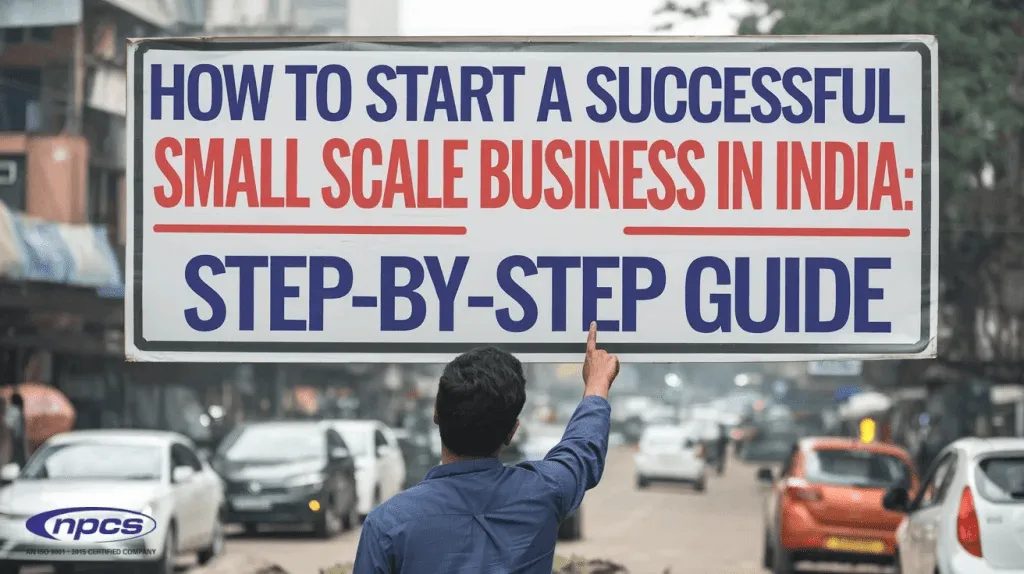India’s small-scale industries (SSIs) form the basis of the economy by taking a lead role in employing its citizens and supporting exports as well. They generally operate with a smaller manpower and bear limited capital investment and localised markets. The industries range over different sectors, including textiles, agro-based industries, food processing, etc. Entrepreneurs are looking for small-scale business ideas. here are the complete guide to start How to Start a Small Scale Business in India.
The ministry for MSMEs states that the small businesses contribute over 30% towards India’s GDP, and millions of people work for them. Their decentralised nature allows them to thrive in both urban as well as rural locations. For this, the government provides a number of incentives, such as financial assistance, providing training, and supporting machinery costs.
Related Project Reports
Contents
- 1 Step to How to Start a Small Scale Business in India
- 2 Conducting Market Research
- 3 Fulfilling Legal Requirements
- 4 Securing Funding and Managing Finances
- 5 Building a Strong Brand Identity
- 6 Marketing and Selling Your Products
- 7 Scaling Your Business
- 7.1 Conclusion
- 7.2 FAQ’s
- 7.3 What is the meaning of small-scale business in India?
- 7.4 What are the best ways to choose an idea for a small-scale business?
- 7.5 What is the legal requirement to start a small-scale business in India?
- 7.6 What are some government schemes available for funding small businesses?
- 7.7 What is the full form of MSME?
- 7.8 What kind of issues do I face when starting a small-scale business, and how do I solve them?
Step to How to Start a Small Scale Business in India
Identifying Profitable Small-Scale Business Ideas
Picking the right business idea is a very important requirement for building a foundation. Consider five trending aspects businesses would like to dive into:
- Organic Farming and Herbal Products: This has gained importance because most people have become aware of their physical health in connection with nature. Products include herbal teas, organic spices, and natural skin care products.
- Making Candles and Soaps: This is a low-investment business that mostly attracts the niche segment of festive times.
- Customising Clothes & Accessories: Bring the edge of e-commerce in reaching a worldwide audience through tailored clothing or even some unique jewellery.
- Food Processing and Packaging: From self-manufactured snacks to pre-cooked meals, this industry is blessed with capabilities, especially in metropolis cities.
- Digital Marketing Services: An increasing number of companies are taking their business online, making that avenue a profitable one for SEO, content creation, and social media management.
Also Read
Features of SME/MSME Business Loans
First, take note of the factors that either qualify or disqualify a business idea, such as your experience, market demand, and available resources. All this will further assure that the idea you end up selecting is the best fit as viable and scalable for your end goals.
Conducting Market Research
Every good business starts with understanding the target audience. Market research allows a company to get an idea of consumer needs, competition, and potential profitability. Here’s how to perform effective research:
- Evaluate Competitors: Check out businesses putting similar products or services on offer. Measure their price comparisons, sale promotion strategies, and customer reviews to find out the gaps.
- Ask Potential Customers: Conduct surveys or interviews to understand consumer preferences and challenges.
- Online Tools: Use Google Trends and Statista to analyse market trends as well as the growth rates of industries.
Indeed, solid market research makes it possible for you to develop a product or service that suits customer needs, which therefore increases the chances of success.
Fulfilling Legal Requirements
Well, these are essential for the smooth running of your business in terms of regulatory compliance: a checklist of legal formalities:
- Udyam registration: is under the Ministry of MSMEs so that you can benefit from tax exemptions and credit support.
- GST Registration: This is the requirement for most businesses to comply with taxation regulations.
- Trade Licenses: You may also need to obtain trade licenses for your new venture, like an FSSAI registration for a food-related business.
- Trademark Registration: protection of brand identity through a registered logo or business name.
Resources like NIIR Project Consultancy Services provide detailed guidance on complying with these legal requirements.
Securing Funding and Managing Finances
Initial capital is the biggest constraint for small-scale industries in India. Luckily, several means of finance are available:
- Government Aid and Schemes: Schemes such as PMEGP and Mudra Loans prove to be the means of low-interest credits for new businesses. You can visit the Ministry of Micro, Small & Medium Enterprises for more information.
- Venture Capital and Angel Investors: If the idea is worth its novel value, pitch it to investors.
- Bootstrapping: This way, start using your savings and borrow from family and friends.
- Crowdfunding Platforms: Sites like Kickstarter entail raising funds while building a loyal client base.
Also Read
Efficient financial management is equally important. Such money-managing software includes Tally or Zoho to capture the flow of cash, expenses, and profits.
Building a Strong Brand Identity
Branding is what differentiates your services from the services you offer your competitors, and it helps you identify them with your audience. Here is how you can create a powerful brand:
- Create a Unique Logo and Tagline: Visual and verbal representations of your business.
- Define Your Brand Voice: Whether your voice speaks in formal tones or casual, apply that style across every platform you use.
- Use Social Media: Effective but low-cost instruments for advertising your brand are Instagram and LinkedIn-type platforms.
In building a strong and long customer relationship, trust and credibility are the main elements.
Marketing and Selling Your Products
Advertising is indeed for all initiatives that require their activities to be made known, as well as driving the actual sales. The mix of online and offline techniques can be most effective for small-scale industries in India on:
- Search Engine Optimisation (SEO): Optimise the website so that it appears atop the Google ranking, thereby increasing visibility.
- Social Media Advertising: Use targeted advertisement through Facebook and Instagram.
- Collaborations: Work with the local mom-and-pop stores to cover more area.
- Exhibitions and Trade Fairs title: Exhibiting and showcasing the profiles of products to buyers or distributors.
Scaling Your Business
Once you have reached a level of stability in business, shift your attention to the area of expansion. Scaling might include:
- Expanding to newer markets or geographical regions.
- Introducing complementary product lines.
- Automating processes to reduce costs and demand for ease of operations.
- Diversifying income streams, launching another online store, or possibly providing subscription services.
Reinvesting profits back into one’s business for growth that lasts.
Conclusion
Though starting a small-scale business might seem terrifying in India, it’s possible only if you plan and do it well. All the possible steps, from choosing the right small-scale business ideas to scaling up to operation levels, form very important steps in the business journey.
Government schemes, marketing investments, and continuous innovations will take you away from the crowd.
FAQ’s
What is the meaning of small-scale business in India?
Small-scale businesses are those having small start-up capital requirements, government subsidies, and specialised finance schemes available specifically for MSMEs. They provide flexibility in operations and the ability to tap into local markets with an opportunity to develop into larger enterprises over time.
What are the best ways to choose an idea for a small-scale business?
Start from a self-assessment of all interests, skills, and market demand. Research on how the customer needs and competitors can be judged. You can also rely on feasibility studies and trend analysis tools like Google Trends to get viable ideas.
What is the legal requirement to start a small-scale business in India?
Some of the most critical requirements include the registration under Udyam for the MSME benefits, getting GST registration, obtaining a license according to the industry (FSSAI for food), and trademark registration for one’s brand identity.
What are some government schemes available for funding small businesses?
Programs like the Prime Minister’s Employment Generation Programme (PMEGP), Mudra Loans, and Stand-Up India provide loans and grants at low interest to entrepreneurs and aim at self-employment/self-growth.
What is the full form of MSME?
MSME refers to Micro, Small, and Medium Enterprises (MSME).
What kind of issues do I face when starting a small-scale business, and how do I solve them?
Most challenges are related to securing funds, managing stiff competition, and finding skilled labor. Government financing has possible options to mitigate these.















